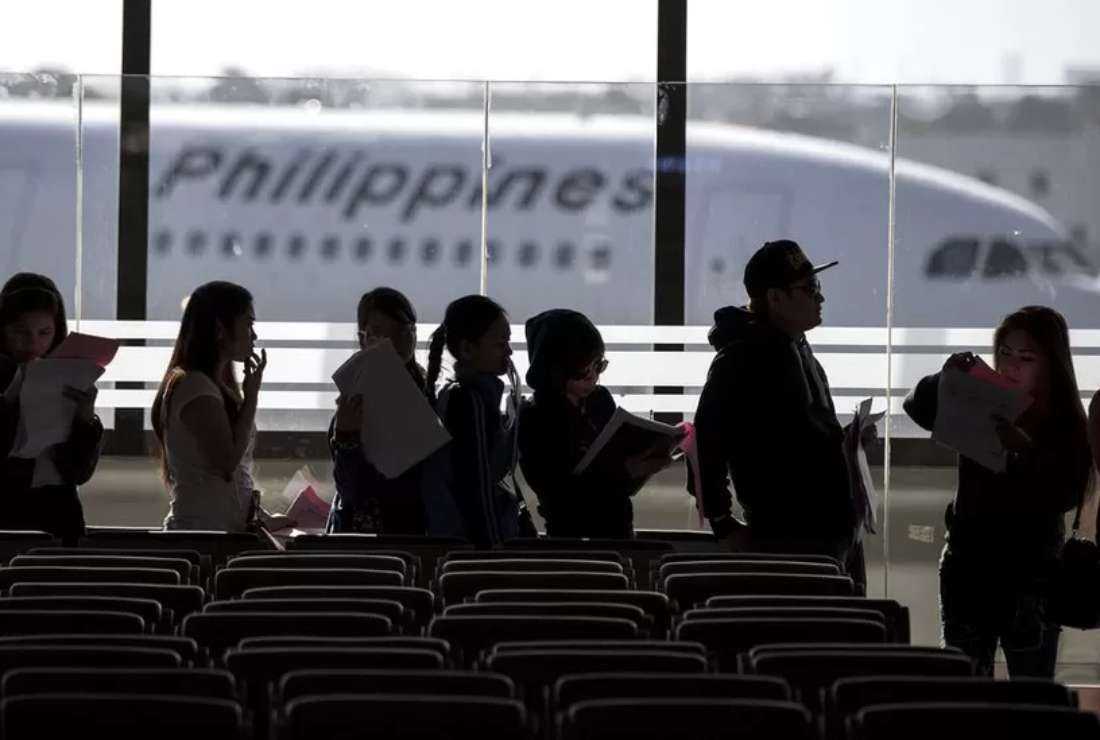
Thousands of Filipino migrants have returned home from Gulf states after the country insisted on implementing strict job contracts amid allegations of abuse. (Photo: AFP/ UCAN files)
Unemployment in the Philippines is expected to worsen as some 120,000 people working in the Persian Gulf nations are likely to return home after the Catholic country insisted on the rights of its overseas workers.
The inflow of migrants intensified in recent months after Philippine authorities moved in to strictly implement job contracts for workers in the Gulf states following the murder of a Filipino domestic helper, Jullebee Ranara, in Kuwait.
The large contingent of estimated 2,000 workers from various countries returned home on June 7, media reports say.
Renara, 34, was allegedly raped, murdered, and burned by her employer’s son before her body was buried in a desert in January.
Since then, Philippine Labor Department pushed for rigorous implementation of job contracts for migrants in the Middle East, leading to the dismissal of workers, reports say.
The country recently banned first-time domestic helpers in Kuwait while bilateral talks with Saudi Arabia and Yemen are ongoing on the safeguarding of Filipino workers’ rights.
“We need to impose our working contract by setting higher penalties. Our countrymen’s contracts had no teeth because there was no imprisonment or fine on the part of the employer. We need to amend this according to their and our law,” Department of Migrant Workers’ secretary Hans Cacdac told UCA News by phone.
One of the measures to stop abuses of migrants in Kuwait was to stop sending domestic helpers to the country despite high demands, he earlier said.
During a press conference on June 7, Cacdac said that “either these countries will accept our demands for the protection of our laborers, or they need to send back our migrant workers if they can’t protect them.”
The move has reportedly resulted in an increase in unemployment in the country, according to the Department of Labor and Employment.
The department said new returnees will add to the tally of an estimated 1.1 million migrant workers who lost jobs and returned home due to the Covid-19 pandemic since 2020.
Labor Secretary Bienvenido Laguesma claimed in a press conference on June 8 that 60 percent of migrants who lost jobs during the pandemic have found jobs.
Repatriated migrant workers said they fear no Middle East country will accept Filipino workers if the government’s “aggressive” stance on the protection of labor rights continues.
Anthena Geron, 32, told UCA News that she is both happy and anxious over the government policy.
“I am happy that our government is proactive in protecting our rights because of the death of Ranara. But I am afraid we will find jobs more difficult because Arab states hate demanding employees,” Geron said.
She said her employer in Kuwait offered a severance package worth US$ 909 and asked to go home as the demands of the Philippine authorities were deemed too strict to cope with.
Cristine Uraway, 29, a housemaid who returned from Saudi Arabia said her employer was afraid of going to jail for paying less salary than the amount mentioned in the contract.
Uraway, a mother of three claimed she worked for two families in the same building because her salary was low, and she needed to earn extra to pay for schooling of her children.
“As per the contract, I was supposed to get a better salary and work for only one employer. So, the new rules made them afraid, so I was asked to leave,” she told UCA News.
“I know my rights are being violated but I endured it… as long as my body could take it, for the sake of my children. Now that I am back here in the Philippines, I am jobless,” she added.
The country is already grappling with a high rate of unemployment. In March, the Philippine Statistics Authority reported there are 2.42 million unemployed Filipino workers out of the total 51 million-strong labor force.
The administration of President Ferdinand Marcos organized a job fair across the country on June 10-12. The event aimed to offer jobs to 72,000 migrants, mostly returnees from the Gulf states.
University of the Philippines political science professor Ranjit Rye warned that the rise in unemployment poses a socio-economic threat to the nation.
“The number of jobless Filipinos triples per year, compared to the number of jobs available. So, jobs in the market couldn’t cope. The effect of this is that people choose to be underemployed rather than unemployed, which is another catastrophe in the labor sector,” Rye told UCA News.


